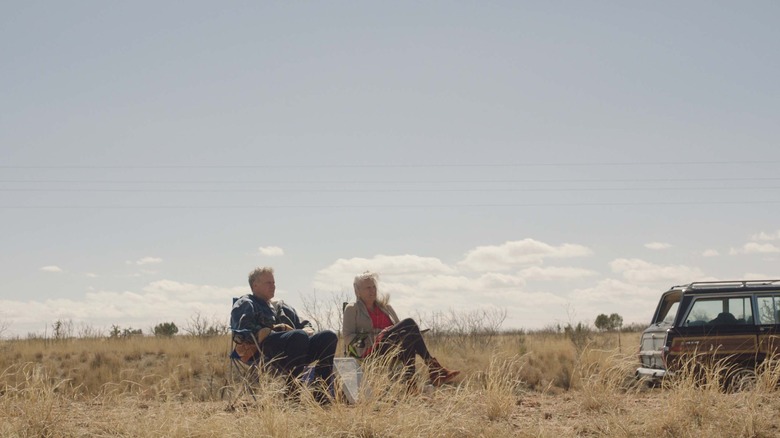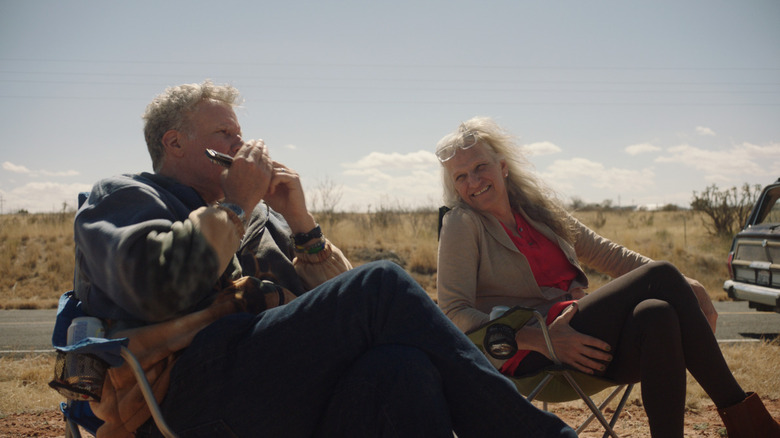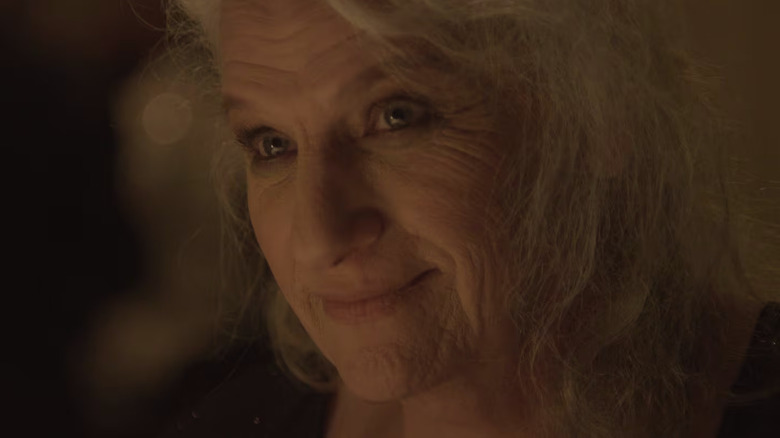Netflix
Harper Steele embodies the kind of woman I admire.
A true Midwesterner, this former “Saturday Night Live” writer is naturally humorous, adept at gently ribbing her celebrity pals, boasts an impressive collection of stylish eyewear, and finds comfort in dive bars, inexpensive beer, and any odd flavor of Pringles she can get her hands on. Men in flyover states are always seeking more women like Steele — women who can keep up, to put it simply — but Steele, a transgender woman who transitioned later in life, is often ostracized in the very circles that would otherwise idolize her. This has made it challenging for her to follow one of her greatest passions, which is taking cross-country drives and making pit stops at out-of-the-way places.
Luckily, Steele shares a longstanding friendship with Will Ferrell, a globally recognized actor. Thanks to roles like Ron Burgundy, Ricky Bobby, and Buddy the Elf, he’s also a hero to Americans from coast to coast. After revealing her true identity to her closest friends, Steele wished to embark on another journey to explore the country she adores, but also acknowledges might not reciprocate her affection. Instead of undertaking this journey alone and exposing herself to potential danger, she invites her renowned comedian friend to accompany her. The objective is not just to provide Steele with an opportunity to indulge in her passion with a safety net in the form of a millionaire, but also to give the eponymous Will and Harper a chance to redefine their friendship.
The outcome is a heartwarming peek into companionship, the growing pains of a well-intentioned ally grappling with the reality of loving a trans person, and an optimistic reminder that supportive voices can be found outside the progressive bubbles of the coasts.
Progress will never be perfect

Netflix
“Will & Harper” is a film designed for those who probably don’t know any trans people outside of those they see in the media. It allows them to see themselves in an everyman like Will Ferrell, learning more about transness and how genuine friendship can exist beyond the confines of gender identity. This means people will laud this film as “courageous” or “inspiring,” which to those who need this “Intro to Trans Friendship 101,’ it certainly is. But for the rest of us, “Will & Harper” is most compelling in its willingness to showcase Ferrell’s missteps. On their first major excursion together, the pair attend an Indiana Pacers game and end up on the jumbotron. Governor Eric Holcomb makes a point to introduce himself to Ferrell, who poses for photos with him just moments after being shown with Harper.
Holcomb is a well-known anti-trans legislator, which means Will Ferrell posed for photos with someone who actively contributes to the oppression of his best friend. Ferrell didn’t intend to cause harm but he swiftly recognizes his error and apologizes extensively. This isn’t the first time he’ll inadvertently cause harm to Harper, but the film, and Harper herself, don’t reprimand him for it, because he’s sincerely trying to do right by his friend. For cisgender people, this movie helps them understand not only what being trans entails, but also what supporting a trans person truly looks like.
Accepting that someone you love is trans is not difficult but truly allowing yourself to feel the weight of how perilous it is for trans people to exist and knowing that your love for them will never be enough to keep them safe … is an overwhelming feeling. Given that Will Ferrell is Will Ferrell, the general public sees him and Harper out and about and voices their opinions online. Harper reads aloud some of the most vicious comments people make about them, and you can see his heart shattering in real-time. Harper isn’t the only one transitioning in this film, because in order to be a better support system for her, Will must also transition his worldview and his role within it.
A country that doesn’t have to be so divided

Netflix
There are a few moments like the Twitter Feed of Despair scene that are quite bleak, but “Will & Harper” also makes it easy to see how the two became friends in the first place and why their friendship has endured. These two just understand each other, and their constant banter and heartfelt conversations in the car are the highlights of the movie. Ferrell is a natural performer but Steele is a talented comedy writer. I can’t help but speculate that had she not been carrying the burden of her transness in her heart until her 60s, perhaps she would have pursued a career in front of the camera as well.
Our heroic duo are also acutely aware of their privilege, and they readily admit that this trip would have looked very different had Harper gone alone, or had she gone with someone other than one of the most famous men in America. At one point Harper goes alone into a biker bar in Oklahoma with Confederate army and “F*** Biden” flags on the wall. Will waits outside until Harper feels too uncomfortable without the safety net, and it’s not surprising but still slightly jarring to see how quickly the room warms up to her once Will’s presence serves as the “go-ahead” for people to treat her like a human being. At the same time, this is a documentary with a crew carrying cameras, so there’s no real way to know how much worse the negative situations could or would have been had people not known they were being documented.
But there are genuine moments of surprise, like when a lively karaoke bar in Peoria, Illinois, or a dirt bike track in the middle of nowhere shows Harper unprompted kindness. It’s a comforting reminder that as much as the media loves to portray Appalachia, the Midwest, and the South as a bunch of bigoted idiots, that’s simply not the case.
Harper Steele is the best of us

Netflix
“Will & Harper” is a delightful little road trip comedy, even if the “unexpected” appearances of famous faces regularly pull the film into a “celebrities, they’re just like us!” realm of pseudo-documentary authenticity. But as I anticipated when the film was first announced as coming to Netflix, “Will & Harper” is a significant film that deserves to be seen by as many people as possible. It’s not just because cisgender people need to learn from Will Ferrell’s example, nor is it because Josh Greenbaum directed a remarkably touching story of friendship. It’s because Harper Steele is exactly the kind of person the world needs more of because she defies all stereotypes about what it means to be trans and/or a Midwest Boomer who happens to be living in New York.
Despite being an Emmy Award-winning writer, Harper Steele has much more in common with the average American than her friend Will Ferrell, right down to her love of Natty Light compared to his preference for ‘some craft beer.” Whether she’s tossing out one-liners, setting off fireworks, accepting that it’s okay to feel pretty sometimes or trying to persuade her Iowan sister to eat a “gift” of sour cream and onion Pringles, she’s a reminder that there’s no “one way” to be trans, which means that anyone from anywhere in America can and likely will know a trans person in their lifetime.
“Will & Harper” acknowledges that just as Ferrell’s presence made Steele safer in a few of the less-than-affirming stops on their road trip, the average viewer will tune into this documentary because Will Ferrell is in it. And while it might seem odd for me to praise Ferrell for doing something I do every day of my life as a cisgender person married to a trans woman, I’m not naive enough to pretend this documentary isn’t arriving at a crucial point in time. When the going gets tough, the tough support their trans friends. Or in the case of Kristen Wiig, write a delightfully catchy song on the ukulele for the end credits.
/Film Rating: 8 out of 10
“Will & Harper” is now streaming on Netflix.
Credit: www.slashfilm.com


